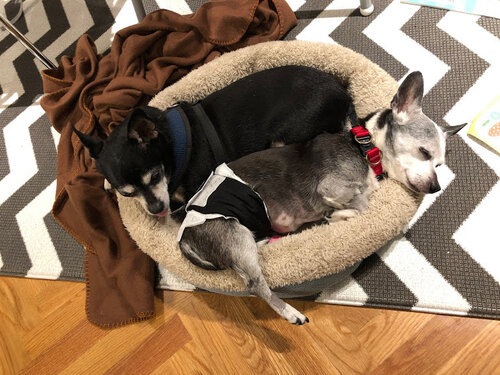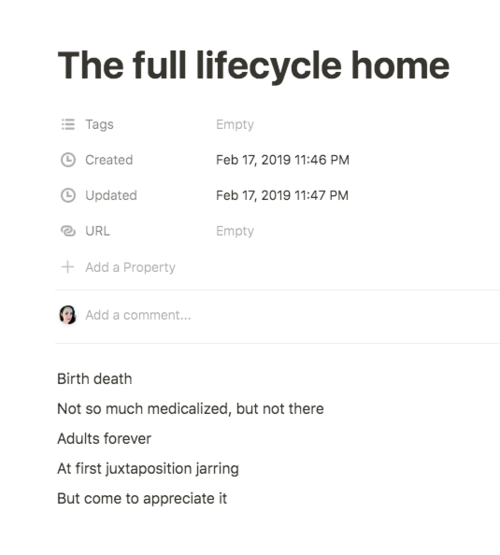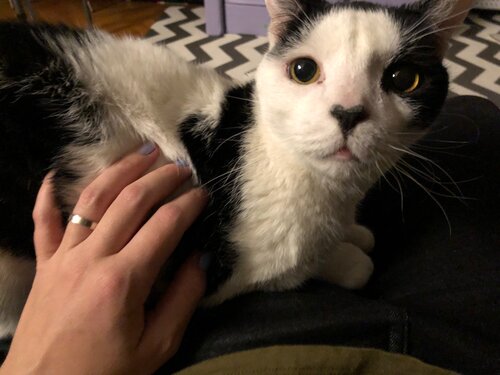The Full Life Cycle Home
You never step into the same meat-body twice. It’s normal to live alongside decline - someday it’ll be yours.
One year and one day ago, I took my dogs for what I didn't know at the time would be their very last evening walk together.

The older of the two, Chip, had been in and out of the hospital several times in recent weeks, battling blood disorders of unknown origin. His prognosis was... "guarded."
Standing outside of our Brooklyn apartment building in what I seem to recall was an unseasonably warm February night, I popped open my phone and made a quick note to write about "the full life cycle home."

Barely 24 hours later, I ushered Chip to the emergency vet late at night to say goodbye. He'd taken another turn for the worse and I felt in my gut that it ought not wait.
Euthanasia was the excruciating capstone of an end-of-life experience I'd set into motion 11 years prior, as a 22 year old graduate student who'd decided she was adult enough to finally get a dog.
The time between the onset of Chip's critical illness and his ultimate death felt magical, in its own twisted way. Apart from diapering him and forcing pills down his gullet, there was nothing for me to do other than enjoy him for where he was - undeniably on the steep decline, but not dead yet.
This is what I meant in my fragment about the "full life cycle home." Chip was dying right in our midst. I did everything I could to take responsibility for him.
But all of our lives plodded on around that little dog. I also had within my care an infant and a toddler, their lives just beginning (probably). I had within my care a nearly-viable fetus. My husband and I were somewhere in between the children and the dog, I guess.
Living alongside the dying was so painful, but how could it be otherwise? It doesn't make sense to have a family that only grows and never shrinks.
All of this got me thinking: it's not normal to live only with other adults, behaving as if now you'll just be in a regular adult body forever. It's not normal for the realities of aging ever to recede completely into the background, even temporarily.
The circumstances of first-world adult lives encourage existential dread containment of a certain sort: at every turn, we are invited to conceive of ourselves as perma-adults.
To the perma-adult, childhood is a tiny sliver of the past, "retirement" might be a tiny sliver of the far future. The thick medium of the trajectory of life is homogenous to a perma-adult, saturated with work and consumption and agency.
Tons of people have noticed that sociocultural shifts have mostly sanitized the moment of death out of our homes. The lesser-noticed change is that many our homes have become stripped of the shades of life. We conspire in this, with our willful ignorance. We conspire because it's comfortable.
Few births, aging hidden and denied, every illness and injury treated as a minor and temporary aberration. What a charade.
The shades of life are extended in time, they're messy. It's not convenient to watch, let alone care for, those within their grip. And sometimes, it's you.
Inhabiting a "full life cycle home" belies the reality of the situation: everyone's always coming or going from life, though you may not know who, why, or when.
Whether it's your dying dog or your screaming newborn, a full life cycle home impresses upon you that there are a million different places to occupy on the circle of life. Life "stages" are not discrete, just a sometimes-useful fiction, and they don't guarantee what's really in the cards anyways.
You never step into the same meat-body twice. The same process that develops us out of infancy and childhood carries us unswervingly (or swervingly...) towards our deaths.
As the anniversary of Chip's death approached, we thought about adding a second pet. I found myself newly attracted towards animals with special needs. After all, adopting a puppy or kitten as fresh as can be isn't going to make it immortal.
We ended up with this 10 year old cat, Moo Moo. She was surrendered to a shelter in Newark and spent 6 months in a foster home on the lower east side before coming home with us to Brooklyn. Along the way, Moo Moo got diagnosed with kidney disease, relegating her to the "heartbreak-waiting-to-happen" pile of homeless pets. She's defective. She's perfect.

People in a Feline Kidney Disease Facebook group told me I have a beautiful soul, for choosing Moo Moo. I don't know if it's true. But I want it to be.
I'd begun to understand the realities of the life cycle when my daughters were born. Then Chip's death, and my father's, intensified the process. By the time my son was born, I'd eaten from the tree of good and evil. I've gorged.
You can't unsee the reality of the life cycle. Life, you are welcome in my home.
Pamela J. Hobart - Philosophical Life Coaching Newsletter
Join the newsletter to receive the latest updates in your inbox.